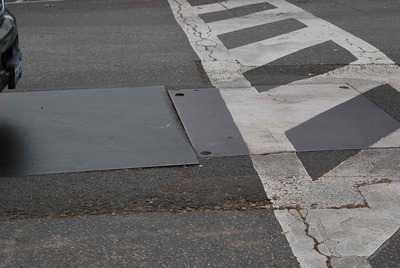
Democratic Assemblyman George Latimer built a safe lead over Republican Bob Cohen in the race for State Senate Tuesday, while former Rye Mayor Steve Otis was the frontrunner against Republican Bill Villanova in a bid to fill Latimer’s Assembly seat.

Democratic Assemblyman George Latimer built a safe lead over Bob Cohen in the race for State Senate Tuesday, while former Rye Mayor Steve Otis was the frontrunner against Republican Bill Villanova in a bid to fill Latimer’s Assembly seat.
Latimer led Cohen, a Republican businessman, by 54 to 46 percent.
Democrat Otis’ lead over Villanova was 63 to 37 percent.
Unofficial vote totals also indicated Rye voters supported a $1.86 million bond referendum to replace infrastructure. About 75 percent of the 5,900 votes cast supported two bond issues.
Among the principal infrastructure projects are: repairing the sinkhole on Purchase Street – that’s what the metal plate opposite Belle Cleaners is covering; replacing the sewer siphon under Locust Avenue; reconstructing the retaining wall on Boston Post Road; and repairing sidewalks and crosswalks in school zones.
In addition, the Bond will pay for installing a sprinkler system at the Rye Free Reading Room.
Mayor Doug French explained, “The bond is designed to address critical needs in and around our downtown and schools that have either a critical safety component or if further delayed would cost significantly more in the long-term due to the decaying infrastructure. If we delay these projects, it will negatively impact future operating budgets and property values.”
The Mayor added, “The remarkably low interest rate environment allows us to address these needs in a financially smart way.”
The cost to taxpayers, on average, will be approximately $19 a year per home. Because of the low interest rates – a ten-year Treasury bill currently pays just 1.75%.
 When asked about the importance of the bond, City Manager Scott Pickup offered a succinct answer. “Rye is a world-class community, and to keep it one we have to keep investing in our town.”
When asked about the importance of the bond, City Manager Scott Pickup offered a succinct answer. “Rye is a world-class community, and to keep it one we have to keep investing in our town.”
Councilwoman Julie Killian stressed the “bare bones” nature of the bond. “It is stripped down to the point where the projects are a necessity. If it doesn’t pass, I worry we won’t find the money in the City budget to fund all of these projects.”
At press time, we received the following letter from Councilwoman Laura Brett, who wanted to share her views on the importance of the bond referendum.
“I am writing this letter to urge you to vote ‘yes’ to the library and infrastructure bonds that will be on the ballot as Proposition 1 and 2 on Election Day. Our beautiful city is badly in need of improvements to our roads and sidewalks.
A ‘yes’ vote on Proposition 1 ($176,000), the Library Bond, will allow the library to install a much-needed fire suppression system as well as fund flood and ADA improvements.
Voting ‘yes’ on Proposition 2 ($1,680,000) will enable the City to rebuild (1) the crumbling road on Smith Street near the corner of Purchase Street, (2) the sewer siphon at Locust Avenue, and (3) the City-owned portion of the retaining wall on the Boston Post Road. Additionally, it will provide funding to improve pedestrian safety at the Smith, Elm, and Purchase Street intersection, and pedestrian crosswalks and sidewalks throughout town.
In past years, the City has funded this kind of infrastructure improvement through surplus in the City budget. During the many years that the national and Rye economy were thriving, the City often had higher revenues than anticipated and would use that extra revenue to fund capital improvements.
As the economy has faltered, City revenues have not generated the surplus experienced in the past. As a result, the City has not had the funding to address these capital expenditures.
The City is working with its finance committee to put together a long-term plan to prepare better for the fiscal challenges that lie ahead. The City considered putting forth a much larger bond with additional capital improvements, but included only the most essential projects in this bond proposal. The improvements addressed in the bond need to be addressed now, before the costs of these projects increase as infrastructure conditions deteriorate.
We cannot wait any longer. As Ben Franklin (who laid out our Boston Post Road) once said, ‘An ounce of prevention is worth a pound of cure.’”















